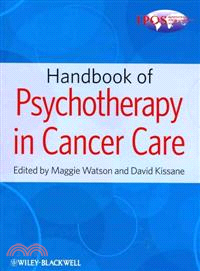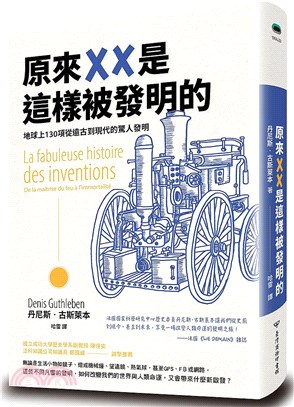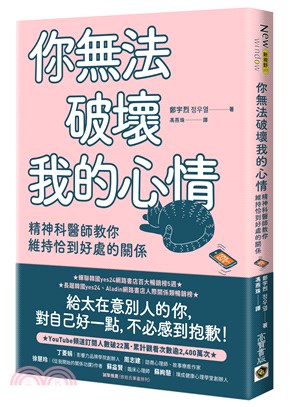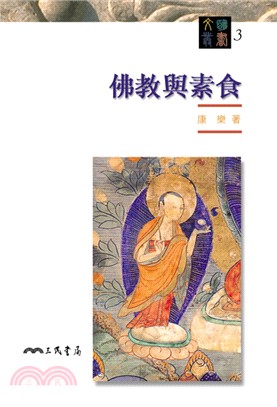Handbook of Psychotherapy in Cancer Care
商品資訊
ISBN13:9780470660034
出版社:JOHN WILEY & SONS;LTD
作者:WATSON
出版日:2011/05/20
裝訂/頁數:平裝/264頁
規格:24.8cm*19.1cm*1.9cm (高/寬/厚)
商品簡介
The editors have brought together leading researchers and therapists, who provide accounts of the prominent models of psychotherapy currently being used in cancer care, the key themes they address and the essential techniques needed to apply each approach successfully. Helpful clinical illustrations are woven throughout the book to make overt the strategies found in each model.
- Provides practical guidance about how to deliver a range of individual, group, couple and family interventions that have proven utility in cancer care.
- Describes comprehensively each model of psychotherapy as taught by experts delivering the International Psycho-Oncology Society’s Educational Academy on cancer care for patients and their families.
- Features practical suggestions on therapy delivery from the world’s leading proponents of each therapy.
- Serves as a valuable tool to assist teaching and to facilitate research into psychological interventions in oncology, palliative care and bereavement.
- Functions as a readily accessible resource for clinicians struggling to support someone effectively, through its provision of insight into the common challenges and traps that arise when providing patients with emotional support.
This practical handbook will help not only psychiatrists, psychologists and social workers but also physicians, surgeons, general practitioners and nurses interested in better understanding and supporting the patients and families they care for.
作者簡介
David Kissane is an academic consultation-liaison psychiatrist, psycho-oncologist and psychotherapy researcher in cancer and palliative care. In 1996, he launched Diplomas of Palliative Medicine and Psycho-Oncology at the University of Melbourne during his tenure as foundation Professor and Director of Palliative Medicine. In 2003, he moved to succeed Dr Jimmie Holland, MD, as Chairman of the Department of Psychiatry and Behavioral Sciences at Memorial Sloan-Kettering Cancer Center in New York. He is the incumbent in the Jimmie C. Holland Chair in Psycho-Oncology, Attending Psychiatrist at The Memorial Hospital for Cancer and Allied Diseases, and Professor of Psychiatry at the Weill Medical College of Cornell University. He is a past President of the International Psycho-Oncology Society (2000-03) and recipient of their Arthur Sutherland Award for Lifetime Achievement in Psycho-oncology in 2008. His academic interests include health communication skills; couple, group and family psychotherapy trials; studies of existential distress; and the ethics of end-of-life care. He is the author of over 150 publications, including two books, Family Focused Grief Therapy (2002) and Handbook of Communication in Oncology and Palliative Care (2009). At Memorial Sloan-Kettering Cancer Center’s Department of Psychiatry and Behavioral Sciences, he has established a state-of-the-art Communication Skills Training and Research Laboratory and a Psychotherapy Research Laboratory. He is Principal Investigator on a range of studies, including dose intensity studies of family therapy in advanced cancer, intimacy-enhancing couples therapy in prostate cancer, facilitation skills development and communication skills training for communication about survivorship, genetic risk, and end-of-life care.
目次
Foreword.
Preface.
Section A: Individual Models of Therapy.
Chapter 1 Supportive Psychotherapy in Cancer Care: an Essential Ingredient of All Therapy.
1.1 Introduction.
1.2 Definition.
1.3 History and Evidence Base.
1.4 Qualifications for Clinical Privileges to Provide Supportive Psychotherapy as a Psycho-Oncologist.
1.5 Application of Supportive Therapy in Cancer Care.
1.6 Boundaries in the Therapy Relationship: Therapeutic Activism.
1.7 Themes Met in Advanced Cancer.
1.8 Families as Part of Patients’ Supportive Psychotherapy.
1.9 Therapist Issues.
1.10 Service Development Issues.
Chapter 2 Cognitive-Behavioural Therapies in Cancer Care.
2.1 Background.
2.2 Processes and Techniques.
2.3 Case Examples.
2.4 Evidence on Efficacy.
2.5 Service Development.
2.6 Summary.
2.7 Supporting Materials.
Chapter 3 Cognitive Analytic Therapy in Psycho-Oncology.
3.1 Introduction.
3.2 Theoretical Background of CAT.
3.3 CAT Concepts and Cancer.
3.4 Process of Application of CAT in Cancer Care.
3.5 Supporting Materials.
3.6 A Brief Overview of Evidence on Efficacy.
3.7 Target Groups of Patients for Whom CAT Is Appropriate.
3.8 Case Example.
3.9 What Can CAT Offer in a Cancer Setting?
3.10 Service Development: Integrating CAT into Psycho-Oncology Services.
3.11 Conclusion.
Chapter 4 Mindfulness Interventions for Cancer Patients.
4.1 Introduction.
4.2 Mindfulness-Based Stress Reduction.
4.3 Content and Processes of Mindfulness-Based Interventions.
4.4 Case Example.
4.5 Efficacy of MBSR and Mindfulness Interventions.
4.6 Service Development.
4.7 Summary.
Chapter 5 Relaxation and Image Based Therapy.
5.1 Background.
5.2 Evidence on Efficacy.
5.3 Processes and Techniques.
5.4 Case Example.
5.5 Service Development.
5.6 Summary.
Chapter 6 Motivational Counselling in Substance Dependence.
6.1 Background.
6.2 Processes and Techniques.
6.3 Case Example.
6.4 Evidence on Efficacy.
6.5 Service Development.
6.6 Summary.
Chapter 7 Narrative Therapy.
7.1 Background.
7.2 Processes and Techniques.
7.3 Case Example.
7.4 Evidence on Efficacy.
7.5 Service Development.
7.6 Summary.
Chapter 8 Dignity Therapy.
8.1 Introduction.
8.2 Background of Dignity Research.
8.3 The Conduct of Dignity Therapy: Processes and Techniques.
8.4 The Therapist's Role.
8.5 Evidence of the Efficacy of Dignity Therapy.
8.6 Service Development.
8.7 Conclusion and Future Directions.
Chapter 9 Written Emotional Disclosure.
9.1 Background.
9.2 Evidence on Efficacy.
9.3 Target Patients.
9.4 Processes and Techniques.
9.5 Appendix: Sample Instructions for Expressive Writing for Cancer Patients and Survivors.
Section B: Group Models of Therapy.
Chapter 10 Supportive-Expressive Group Psychotherapy.
10.1 Introduction.
10.2 Theoretical Background and Themes.
10.3 Goals of Supportive-Expressive Groups.
10.4 Target Groups of Patients for Whom It Is Appropriate.
10.5 Processes and Techniques.
10.6 Case Example.
10.7 Evidence for Efficacy of SEGT.
10.8 Service Development.
Chapter 11 A Short Term, Structured, Psychoeducational Intervention for Newly Diagnosed Cancer Patients.
11.1 Introduction.
11.2 Theoretical Background and Themes of Our Psychoeducational Model.
11.3 Target Groups of Patients and Evidence of Efficacy of the Structured Psychoeducational Group Intervention.
11.4 Process, Techniques and Case Example.
11.5 Service Development.
11.6 Summary.
Chapter 12 Meaning-Centered Group Psychotherapy.
12.1 Introduction.
12.2 Background.
12.3 Theoretical Conceptual Framework Underlying Meaning-Centred Psychotherapy.
12.4 Target Groups of Patients.
12.5 Main Themes and Format of the Therapy.
12.6 Key Therapist Techniques in the Application of MCGP.
12.7 Case Example.
12.8 Key Challenges in Application of MCGP.
12.9 Overview of Evidence on Efficacy.
12.10 Service Development and Future Directions.
12.11 Summary.
Chapter 13 Couple-Focused Group Intervention for Women with Early Breast Cancer and Their Partners.
13.1 Background.
13.2 Intervention Strategies and Main Themes of the Couple-Focused Group (CFG).
13.3 Evidence on Efficacy.
13.4 Processes and Techniques.
13.5 Case Example.
13.6 Service Development.
13.7 Summary.
13.8 Supporting Materials.
Section C: Couple and Family Therapies.
Chapter 14 Couples Therapy in Advanced Cancer: Using Intimacy and Meaning to Reduce Existential Distress.
14.1 Introduction.
14.2 Integrating Meaning-Making and Intimacy: Working Models.
14.3 Processes: Structure and Overview of Therapy.
14.4 Couple Exercises and Case Examples.
14.5 Evidence on Efficacy.
14.6 Service Development.
14.7 Summary.
Chapter 15 Therapies for Sexual Dysfunction.
15.1 Background.
15.2 Processes and Techniques.
15.3 Case Examples.
15.4 Evidence on Efficacy.
15.5 Service Development.
15.6 Summary.
15.7 Supporting Materials.
Chapter 16 Focused Family Therapy in Palliative Care and Bereavement.
16.1 Theoretical Background.
16.2 Target Groups of Patients.
16.3 Main Themes and Format of the Therapy.
16.4 Therapy Processes and Techniques.
16.5 Supporting Materials.
16.6 Overview of Evidence on Efficacy.
16.7 Case Examples.
16.8 Service Development.
16.9 Summary.
Section D: Therapies Across the Life Cycle.
Chapter 17 Therapy in the Setting of Genetic Predisposition to Cancer.
17.1 Background.
17.2 Counselling and Psychotherapeutic Interventions.
17.3 Case Example.
17.4 Evidence on Efficacy.
17.5 Service Development.
17.6 Summary.
17.7 Supporting Materials.
Chapter 18 Psychotherapy with Paediatric and Adolescent Cancer Patients.
18.1 Introduction.
18.2 Assessment.
18.3 Service Development.
18.4 Treatment Selection: Methods, Techniques and Efficacy.
18.5 Issues in Treatment.
18.6 Case Discussion: a Multidisciplinary Team Approach.
18.7 Summary.
Chapter 19 Therapy for Parental Cancer and Dependent Children.
19.1 Background.
19.2 Theoretical and Evidence-Based Rationale.
19.3 Components of the Programme.
19.4 Evidence for Efficacy.
19.5 Summary of the Training Programme.
19.6 Current and Future Directions.
Chapter 20 Psychosocial Interventions for Elderly Cancer Patients.
20.1 Introduction.
20.2 Cancer in the Elderly: Clinical Evaluation.
20.3 Quandaries and Reliability of Interventions.
20.4 Psychosocial Theories on Ageing: Basis for Interventions.
20.5 Elderly Cancer Patient Interventions.
20.6 Forgiveness: Life – Illness – Death.
20.7 Cognitive-Behavioural Therapy.
20.8 Life and Hope: Transforming Fear into Hope.
20.9 Selected Therapies: Intervention Techniques with Groups of Elderly Cancer Patients.
20.10 Case Examples.
20.11 Overview of Evidence for Therapeutic Benefit.
20.12 Conclusion.
Chapter 21 Reconstructing Meaning in Bereavement.
21.1 The Clinical Context.
21.2 Theoretical Perspectives: the Changing Landscape of Loss.
21.3 Grief and the Quest for Meaning.
21.4 Techniques for Reconstructing Meaning in Loss.
21.5 Clinical Illustration of Therapy as Meaning Reconstruction.
21.6 Overview of Efficacy of Meaning-Making Interventions.
21.7 Service Development to Build a Programme.
21.8 Conclusion.
References.
Index.
主題書展
更多書展本週66折
您曾經瀏覽過的商品
購物須知
外文書商品之書封,為出版社提供之樣本。實際出貨商品,以出版社所提供之現有版本為主。部份書籍,因出版社供應狀況特殊,匯率將依實際狀況做調整。
無庫存之商品,在您完成訂單程序之後,將以空運的方式為你下單調貨。為了縮短等待的時間,建議您將外文書與其他商品分開下單,以獲得最快的取貨速度,平均調貨時間為1~2個月。
為了保護您的權益,「三民網路書店」提供會員七日商品鑑賞期(收到商品為起始日)。
若要辦理退貨,請在商品鑑賞期內寄回,且商品必須是全新狀態與完整包裝(商品、附件、發票、隨貨贈品等)否則恕不接受退貨。























